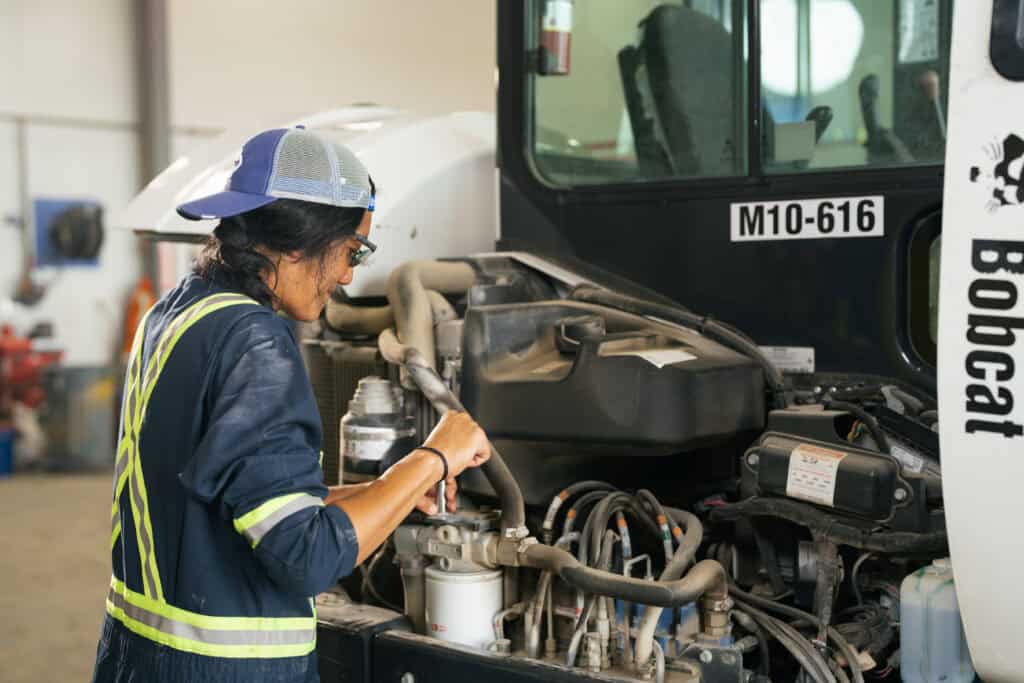Image courtesy of Uptown Media.
There’s one word that sends chills down the spine of any contractor: downtime.
It’s disruptive, affects productivity, and can take a huge financial toll. Business, after all, is not as usual when unplanned external factors disrupt workflows, bring equipment to a screeching halt or force workers to scramble and rethink processes to make up for lost time.
It’s not always about repairing a downed piece of equipment that results in lost productivity – but how it impacts the job. Consider the hours of work lost due to generators overheating, incorrect use of fuel or equipment breaking down and requiring service because someone didn’t read an operator’s manual. Occasional issues are to be expected, but these pain points often start small and build over time, growing from a minor annoyance into a major headache as they go unresolved over months and even years.
All hope is not lost! Some downtime will be unavoidable, of course. But you can keep it to a minimum by being proactive and working with your equipment rental partner. We see a lot of customers in a day – so it’s safe to say we’ve identified some common trends when it comes to equipment malfunction. Every call you make to your equipment provider is time out of your day. We don’t want that for you. Preventing downtime before it happens is about identifying issues early on before they turn into big problems.
1. Read the operator’s manual
Imagine you’re on vacation and rent a car. Suddenly a storm hits and heavy rain comes belting out of the sky. Is that the time and place to try to figure out where your headlights and windshield wiper controls are located? Of course not.
This is why operators must read the manual and be completely familiar with the machine they are operating. A lot of service calls and accidents can be avoided this way. Enhanced safety components have changed the way newer machines operate, creating some challenges for those used to older equipment. And just because you’ve read an operator’s manual for one machine doesn’t mean you’ve read them all. Equipment differs depending on its year and model. Familiarize yourself with the equipment you’re about to operate by reading the manual before you even get in the machine.
For example, new aerial lifts and booms have load-sensing technology to prevent accidents. Electric excavators have a secondary safety system which ensures that the working end of the machine doesn’t move if the operator accidentally hits the lever. Other equipment comes with master disconnects which de-energizes the entire machine when needed. These are all important safety features found in the operator’s manual that anyone operating the machine should be aware of.
2. Avoid overheating
One of the best ways to avoid equipment malfunction and unexpected downtime is by maintaining a well-functioning cooling system. The cooling system normalizes the temperature of the engine and prevents overheating. Regular maintenance and inspections (especially if you’re working in dusty/dirty conditions) are imperative to ensure optimal performance.
Fluids also play a big role in how your equipment operates; hot weather can put added strain on the components of the machine. Regularly check fluid levels, including engine oil, hydraulic fluid, and coolant. It’s important to ensure coolant levels are adequate and that the coolant mixture adheres to the manufacturer’s specifications. Higher-quality fluids will also help extend maintenance hours.
It’s also important to keep in mind the quality of your diesel exhaust fluid (DEF). Maintaining the integrity of DEF is key, but it’s not always that easy. Common elements found around containers and tanks can wreak havoc. Equipment using contaminated DEF will consume more fluid and be less effective at reducing emissions from the exhaust, over time it can potentially cause the engine to shut down.
3. Know your fuel and keep storage tanks clean
Using clean fuel is the simplest and most important thing you can do for your equipment. New Tier4 engines are more sophisticated, but also more sensitive. They run on a higher-pressure system so any small contaminants, such as dirt, debris or water can affect machine performance and cause problems for your equipment. Be sure to inspect tanks regularly and clean them as needed. You should also keep the type of fuel you’re using in mind. A lower-quality fuel is more likely to become contaminated, leading to engine failures and higher maintenance costs.
4. Rent the right equipment for the job
Properly loading equipment is a great way to keep maintenance down AND reduce costs while you’re at it. Equipment that’s either over- or underutilized is all too common on the jobsite.
As with any asset, it’s important to be clear on the job to be done and resource accordingly to optimize operation and maintenance costs. Let’s look at your common generator – we see many being pushed through to failure – resulting in carbon build-up in the unit and some costly repairs. Traditional generators are sized for peak loads and must keep running even if loads are small. Newer hybrid generators do the opposite. They operate in what we call the ‘Goldilocks zone’ – not too big, not too small but just right. This means they save on fuel and run time, reducing noise and extending service intervals.
Heaters are another piece of equipment where we see common failures related to improper sizing. It could be as simple as using the wrong extension cord or power wire length but there can also be more complicated factors at play when it comes to understanding what type and size of heater is needed for the job. Coming up with the right solution is much easier when you work with a rental partner who can help you understand the needs of your job site.
5. Education and training are key
Education and training cannot be overlooked. With equipment evolving so rapidly, the right training for your people is crucial. Many operators may have the right industry or jobsite experience but hesitate when it comes to new technology or equipment that is more complex to operate.
In addition to providing, you with equipment, your rental partner should be able to offer in-class and online training for equipment and safety programs. This could include how to safely operate a forklift or aerial equipment. Most of these courses consist of in-class training followed by on-site evaluations which verify the individual’s ability to operate a piece of equipment safely.
Final thoughts: Equipment maintenance isn’t just for mechanics
It goes without saying, but construction equipment failure can have significant consequences, like unnecessary downtime, high repair costs or even injury. At the end of the day, when you take steps to prevent machine failure, you can spend more time productively. Start with a reliable rental partner, then make sure you have the right maintenance plan, training and solid knowledge of your equipment. These steps can go a long way in identifying issues early on and preventing common equipment malfunctions.


